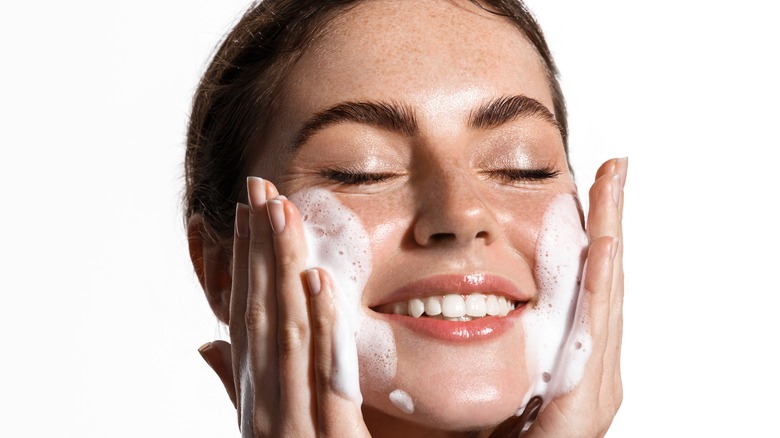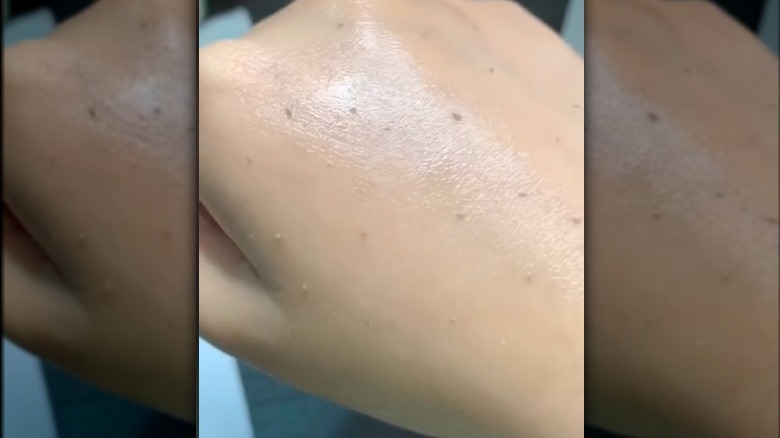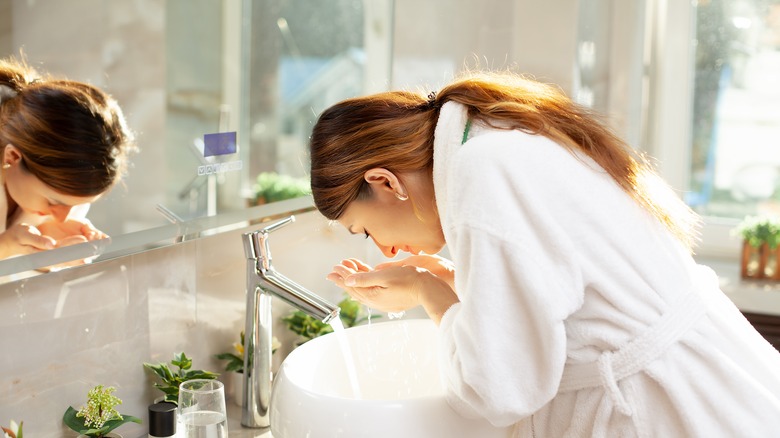Is TikTok's 15-Minute Cleansing Challenge Really Worth The Hype?
There are a number of beauty rules that are second nature to us. If you're doing a red lip always line. Moisturizer before face oils. And please, never ever go to sleep with your makeup on. These are just a few of the many beauty commandments we've all grown accustomed to, but if there's only one that you take seriously it should always be to cleanse your face and remove any trace of makeup at the end of every day.
There really isn't a skincare struggle that isn't made worse by not thoroughly cleansing your face. In fact, what everyone should really be doing is abiding by the double cleansing rule, going in with an oil/balm cleanser first to remove your makeup and then going in for a second round with a regular face wash, per Glamour.
The only problem is that when it comes to cleansing your face there are a lot of dos and don'ts. Facial cleansing tools, for example, have always been a hotly debated topic, and the verdict is yet to be set on whether they do more harm than good or not, per Huffington Post. Naturally, when a newly hyped cleansing trend began to circulate on TikTok, many wondered if this was going to help your skin or hurt it. Is TikTok's 15-minute cleansing challenge really worth the hype?
What is 15-minute oil cleansing?
TikTok beauty trends come and go, and they either end up as huge successes that make it into everyone's beauty routine or they end up the punchline of a joke on how strange TikTok can be. When a challenge began to circulate that involved massaging oil into your skin for 15 minutes, there was no telling which way it would go. It all began when TikToker @opulentjade shared her best-kept secret to tackling blackheads. She explained in the video that she learned this trick from an aesthetician that suggested massaging an oil cleanser into your skin for 15-20 minutes to really work the oil and debris out of your clogged pores.
The idea sounds simple enough, as said aesthetician Nayamka Roberts-Smith explained, "Oil dissolves oil. Oil cleanser attracts lipids in your pores and on the surface of your skin to wash it away. If you have acne-prone skin, oil cleansing is going to loosen congestion in your skin in a really gentle, non-inflammatory way," per Bustle. @opulentjade alongside the other 11.9 million viewers of the trend on TikTok have all shared their own takes, showcasing their hands covered in what appears to be removed blackheads as a sign of its success. But is rubbing oil into your skin for 15-20 minutes going to help clear out your pores or clog them further?
What the experts are saying about the oil cleanse
Anything that involves excessive oils or heavy creams can generally be concerning when it comes to skincare. Too much of a good thing can often lead to clogging your pores and resulting in breakouts. This was the main concern for many when hearing about the 15-minute oil cleansing challenge. Stylist beauty writer Hanna Ibraheem tried it herself and deemed the whole process tiring and boring with little results. Daniel Isaacs, director of research at Medik8, also shared his concern on how it could affect certain skin types: "For sensitive skins, this can cause unnecessary trauma to the skin," he said.
It's not officially deemed unnecessary, however. Co-founder of The Inkey List, Mark Curry, is a huge supporter of the method, per Bustle. While co-founder Megan Felter of Lion/Ne explained to Bustle, "... there is no evidence to suggest that you aren't trading one problem for another. This trend could lead to further pore clogging and additional build-up/production of sebum long term."
It looks like another mind-boggling TikTok trend with no clear verdict. One thing is for certain though, skin specialist Dr. Emma Cunningham suggests, "I would definitely proceed with caution ... In my opinion, there is no evidence to suggest that using this method will not substitute one problem for another," per Refinery29. While some may have seen results, it's probably best to skip the extra 15-20 minutes in the bathroom to avoid the likelihood of this backfiring.


